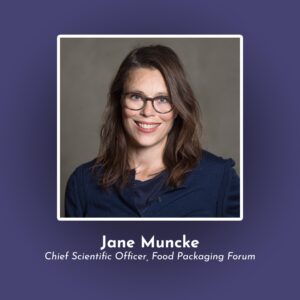
Show Summary
On this episode, toxicology scientist Dr. Jane Muncke joins Nate to discuss the current state of food production and the effects of ultra processed foods and their packaging on our health. Over the last century processed food has taken over our supermarkets and our diets, and at the same time the containers they’re sold in have evolved as well – to be more eye-catching and keep food ‘good’ for longer. But what have we sacrificed in exchange for efficiency, ease, and convenience? How do the chemicals used in packaging and processing transfer into the food we eat and subsequently end up in our bodies? Will switching away from these toxic food practices require more local food supply chains – and correspondingly simpler diets and lifestyles?
About Jane Muncke
Jane Muncke holds a doctorate degree in environmental toxicology and a MSc in environmental science from the ETH Zurich. Since 2012 she has been working as Managing Director and Chief Scientific Officer at the charitable Food Packaging Forum Foundation (FPF) in Zurich, Switzerland. FPF is a research and science communication organization focusing on chemicals in all types of food contact materials. She is a full scientific member of the Society of Toxicology (SOT), the Society for Environmental Chemistry and Toxicology (SETAC), the American Chemical Society (ACS) and the Endocrine Society. Since 2019, she has been an elected expert member of the Swiss Organic Farming Association Bio Suisse’s committee on trade and processing where she contributes to further developing the standards for processing and packaging of organic food. She is a director of the FAN initiative, a collective of experts warning about resource overshoot, the polycrisis, and related societal collapse.
In French, we have a motto that says that a simple drawing is often better than a long explanation. Jean-Marc Jancovici Carbone 4 President
That’s very understandable because with left atmosphere thinking, one of the problems is that you see everything as a series of problems that must have solutions. Iain McGilchrist Neuroscientist and Philosopher
We can’t have hundreds and hundreds of real relationships that are healthy because that requires time and effort and full attention and awareness of being in real relationship and conversation with the other human. Nate Hagens Director of ISEOF
This is the crux of the whole problem. Individual parts of nature are more valuable than the biocomplexity of nature. Thomas Crowther Founder Restor
Show Notes & Links to Learn More
Download transcript00:00 – Jane Muncke works and info
00:58 – Jeremy Grantham + TGS Episode
03:01 – Just Stop Oil Frankly
04:43 – Zebrafish and Research
06:10 – Bisphenol A
06:33 – Frederick vom Saal
08:39 – Ultra Processed food
09:21 – Robert Lustig + TGS Episode
12:01 – Energy Storage
12:45 – Nicolas Appert | Biography & Facts
13:22 – Food packaging science
14:07 – Major food corporations produce all of their products in very few facilities
16:14 – Plastic Pollution, persistent plastic
16:46 – Charles Moore
16:55 – Plastic accumulation in the oceans, plastic found on remote islands
18:10 – Plastic outweighs all living animals, More Plastic Than Fish in the Oceans
18:39 – Health effects of plastic pollution
19:02 – Plastic production
19:24 – Chemical Migration
21:16 – Unknown complexity of chemical composition of plastic
22:33 – Chemical exposures and the difficulty of testing for them
23:56 – 20% of plastic production is for food packaging
24:39 – EU is ahead on legislation regulating plastic pollution, but doesn’t really enforce them
25:20 – Rwanda the first country to ban plastic bags
27:19 – Switzerland organic regulation and plastic packaging
29:08 – Haber Bosch
30:31 – Accelerants of chemical migration in food packaging
31:24 – The Perils Of Polystyrene
31:57 – Plastic particles found in blood
33:40 – Endocrine Disruptors, Health effects
35:12 – Chronic disease globally increasing
36:29 – Top social media execs don’t allow their children to use social media
38:11 – Vicious cycle in the food system
38:44 – Chemical migration in paper and cardboard packaging
39:28 – True circularity of glass
42:19 – Lipophilic
44:34 – Slow Food Movement
44:50 – 40% of the global population are overweight, 10% are obese, and in the U.S. 40% are obese
45:31 – Chris van Tulleken , Ultra-Processed People
46:16 – Food processing equipment and chemical migration
47:48 – Perchlorate, organophosphates
More:
The Plastic Chemicals Hiding in Your Food – Consumer Reports
Guidance on PFAS Exposure, Testing, and Clinical Follow-Up | The National Academies Press







